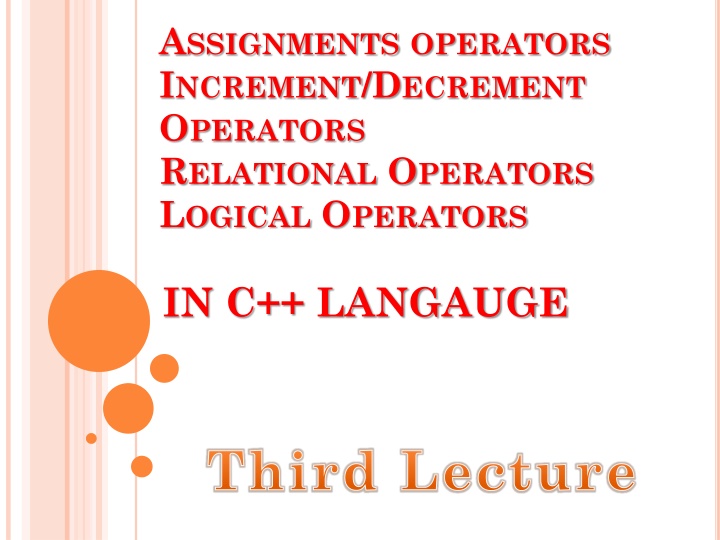
Understanding Assignment, Increment/Decrement, Relational, and Logical Operators in C++
Explore the concepts of assignment, increment/decrement, relational, and logical operators in C++ with examples. Learn how to use these operators effectively in programming to manipulate variables and make decisions.
Download Presentation

Please find below an Image/Link to download the presentation.
The content on the website is provided AS IS for your information and personal use only. It may not be sold, licensed, or shared on other websites without obtaining consent from the author. If you encounter any issues during the download, it is possible that the publisher has removed the file from their server.
You are allowed to download the files provided on this website for personal or commercial use, subject to the condition that they are used lawfully. All files are the property of their respective owners.
The content on the website is provided AS IS for your information and personal use only. It may not be sold, licensed, or shared on other websites without obtaining consent from the author.
E N D
Presentation Transcript
ASSIGNMENTS OPERATORS INCREMENT/DECREMENT OPERATORS RELATIONAL OPERATORS LOGICAL OPERATORS IN C++ LANGAUGE Third Lecture
Assignment Operators : The left-hand operand of an assignment operator must be a nonconst value. Each of these assignments is illegal: int i, j, ival; const int ci = i; // ok: initialization not assignment 1024 = ival; // error: literals are values i + j = ival; // error: arithmetic expressions are values ci = ival; // error: can't write to ci we can perform multiple assignments in a single expression, provided that each of the operands being assigned is of the same general type int ival, jval; ival = jval = 0; // ok: each assigned 0
This program illustrates the uses of some simple variable. #include <iostream.h> int main (void) { int workDays; float workHours, payRate, weeklyPay; workDays = 5; workHours = 7.5; payRate = 38.55; weeklyPay = workDays * workHours * payRate; //arithmetic statement cout << "Weekly Pay = "; //output statement cout << weeklyPay; cout << '\n'; }
This program illustrates the use of >> for input. #include <iostream.h> int main (void) { int workDays = 5; float workHours = 7.5; float payRate, weeklyPay; cout << "What is the hourly pay rate? "; cin >> payRate; //Input statement weeklyPay = workDays * workHours * payRate; cout << "Weekly Pay = "; cout << weeklyPay; cout << '\n'; } H.W.//write program to find circle volume and area? when radius = 10
Standard Mathematical Functions The header <math.h> provide what is commonly referred to as the usual mathematical functions: double abs(double) ; / / absolute value; double sqrt(double d) ; / / square root of d, d must be nonnegative double pow(double d, double e) ; / / d to the power of e, // error if d==0 and e<=0 or if d<0 and e isn t an integer. double pow(double d, int i) ; / / d to the power of i;
Q//Find z value, when z=xy ? #include<iostream.h> #include<math.h> int main() { int x,y,z; cout<< enter base ; cin>>x; cout<< enter foundation ; cin>>y; z=pow(x,y); cout<<"z="<<z; }
Increment/Decrement Operators The auto increment (++) and auto decrement (--) operators provide a convenient way of, respectively, adding and subtracting 1 from a numeric variable. The examples assume the following variable definition: int k = 5; Both operators can be used in prefix and postfix form. The difference is significant. When used in prefix form, the operator is first applied and the outcome is then used in the expression. When used in the postfix form, the expression is evaluated first and then the operator applied.
Increment/Decrement Operators X=X+2; X=X-3; X=X*2; X=X/2; X+=2; X-=3; X*=2; X/=2; X=X+Y; X=X-Y; X=X*Y; X=X/Y; X+=Y; X-=Y; X*=Y; X/=Y;
Relational Operators C++ provides six relational operators for comparing numeric quantities. Relational operators evaluate to 1 (representing the true outcome) or 0 (representing the false outcome). Operator Name Example Equality 5 == 5 // gives 1 == Inequality 5 != 5 // gives 0 != Less Than 5 < 5.5 // gives 1 < Less Than or Equal 5 <= 5 // gives 1 <= Greater Than 5 > 5.5 // gives 0 > Greater Than or Equal 6.3 >= 5 // gives 1 >=
Logical Operators C++ provides three logical operators for combining logical expression. Like the relational operators evaluate to 1 or 0. operators, logical Operator Name Example Logical And 5 < 6 && 6 < 6 // gives 0 && Logical Or 5 < 6 || 6 < 5 // gives 1 || Logical Negation (Not) !(5 == 5) // gives 0 ! C++ does not have a built-in boolean type. It is customary to use the type int for this purpose instead.






















